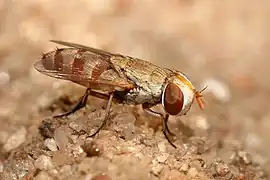| Craticulina | |
|---|---|
 | |
| Craticulina seriata | |
| Scientific classification | |
| Domain: | Eukaryota |
| Kingdom: | Animalia |
| Phylum: | Arthropoda |
| Class: | Insecta |
| Order: | Diptera |
| Family: | Sarcophagidae |
| Subfamily: | Miltogramminae |
| Genus: | Craticulina Bezzi, 1906[1] |
| Type species | |
| Nyctia frontale | |
| Synonyms | |

A Craticulina which has found the lair of a sand wasp

South African species of Craticulina, kleptoparasite of Philanthus, grooming with hind legs while awaiting host
Craticulina is a genus of true flies in the family Sarcophagidae. They are cleptoparasites of various species of sand wasps. They are ovoviviparous, laying larvae instead of eggs. The larvae share the prey of the sand wasp, and though they are much smaller than the wasps, many fly larvae may be present in each wasp larva, causing food to run short. Sometimes the fly larvae also attack the wasp larvae while they are small, especially if too many fly larvae and too little food are present.
The flies are sand coloured, which no doubt helps camouflage them, but at least some species of hosts take evasive action when Craticulina species are present, though it is not clear how effectively.
Species
- C. antachates (Séguy, 1949)
- C. barbifera (Pandellé, 1895)[2]
- C. bequaerti Venturi, 1958
- C. diffusa Villeneuve, 1934
- C. digressum Séguy, 1953[5]
- C. fimbriata Bezzi, 1911[6]
- C. genesae Verves, 2000
- C. gussakovskii Verves, 1993
- C. tabaniformis (Fabricius, 1805)
- C. transvaalensis Zumpt, 1961
- C. zimini Verves, 1993
References
- 1 2 Bezzi, Mario (1906). "Noch einige neue Namen fur Dipterengattungen". Zeitschrift für systematische Hymenopterologie und Dipterologie. 6: 49–55. Retrieved 5 December 2020.
- 1 2 3 Pandellé, Louis (1895). "Études sur les Muscides de France. IIe partie (suite)". Revue d'entomologie. 14: 287–351.
- ↑ Pape, Thomas H. (1996). "Catalogue of the Sarcophagidae of the World (Insecta:Diptera)". Memoirs on Entomology, International. Utah: American Entomological Institute. 8: 1–558. ISBN 9781566650632.
- ↑ Steyskal, G. C.; El-Bialy, S. (1967). "A list of Egyptian Diptera with a bibliography and key to families". United Arab Republic, Ministry of Agriculture, Technical Bulletin. 3: 1–87.
- ↑ Séguy, E. (1953). "Diptères de Mauritanie". Encyclopédie Entomologique, Série B, II: Diptera. 11: 65–71.
- ↑ Bezzi, Mario (1911). "Miodarii superiori raccolti dal signor C. W. Howard nell'Africa australe orientale". Bollettino del Laboratorio di Zoologia Generale e Agraria della R. Scuola Superiore d'Agricoltura. Portici. 6 [1912]: 45–104. Retrieved 5 December 2020.
This article is issued from Wikipedia. The text is licensed under Creative Commons - Attribution - Sharealike. Additional terms may apply for the media files.